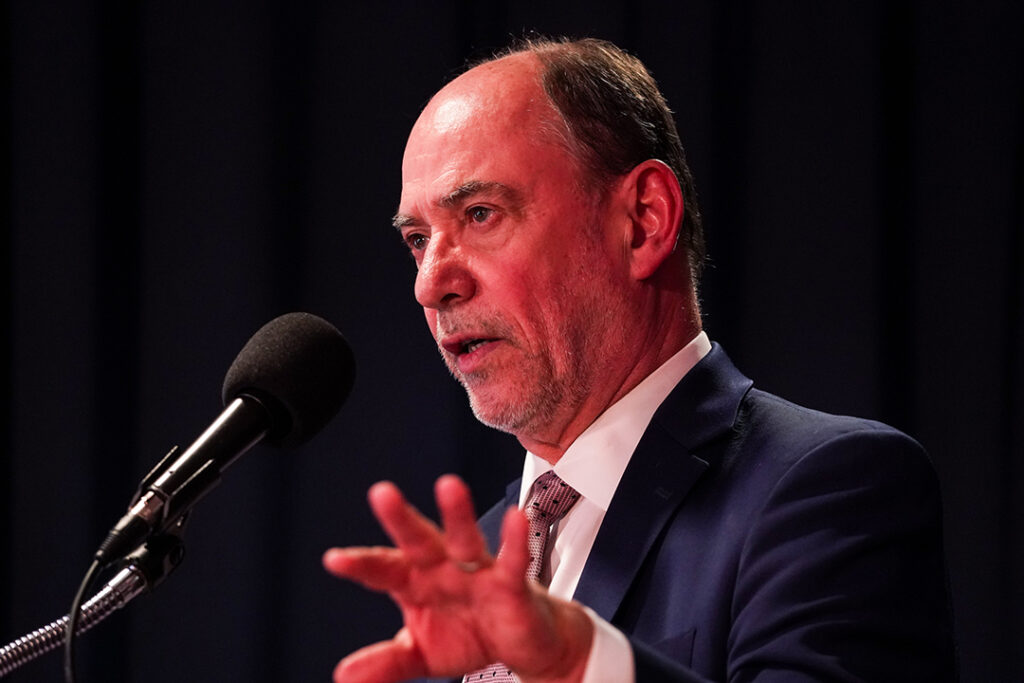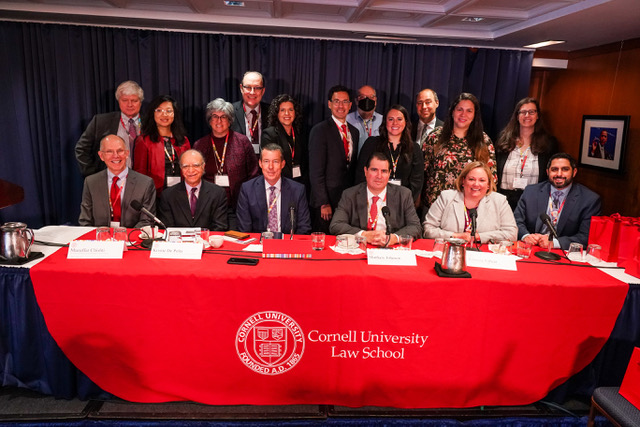This website uses cookies
We use cookies to ensure that we give you the best experience on our website. If you continue to use this site we will assume that you are happy with it.
Congress has been unable to enact comprehensive immigration reform for over thirty years. On February 24, at the National Press Club in Washington, D.C., a diverse group of policymakers, experts, advocates, students, and stakeholders convened to explore what it would take to change that. They were presenters and attendees at “Immigration Reform: Lessons Learned and A Path Forward,” a conference sponsored by Cornell Law School’s Immigration Law and Policy Research Program and cosponsored by the Cornell Migrations Initiative.

Douglas Holtz-Eakin, president of the American Action Forum, delivers the keynote address
Both in-person and over Zoom, about 220 people attended the conference, which explored targeted legislation and other policy changes that could be enacted in 2023. Panels focused on three topics: work visa changes to help alleviate high-skilled and low skilled-labor shortages, border security and asylum reforms, and a permanent path forward for Dreamers, farmworkers, and others.
“Major reforms require the convergence of a widely recognized problem, policy solutions, and sufficient political will,” says Stephen Yale-Loehr, conference co-organizer and Cornell Law professor of immigration law practice. “Our conference brought together expert scholars, analysts, and advocates to probe ways to clarify key problems, identify achievable policies, and build the political will needed to enact them. We hope to build on the conference discussions to develop constructive proposals that have a realistic chance of enactment this year.”
The keynote was given by economist Douglas Holtz-Eakin, president of the American Action Forum. Holtz-Eakin made an argument for the benefits of immigration based on a set of driving economic forces: enormous global pressure for economic migration paired with the United States’ sub-replacement fertility, declining labor pool, and skills deficits. Noting the recent slowing of the country’s GDP growth, he said, “There’s a palpable sense of the American Dream just disappearing over the horizon.”

Group photo of speakers at the conference on “Immigration Reform: Lessons Learned and A Path Forward”
On a more hopeful note, he observed that the United States “has never really used economic policy as an important component” of immigration reform and that, by doing so, we might find that the shared desire for economic growth could unify the disparate parties involved.
“In the absence of immigration, we get older, we get smaller, our economy shrinks, our ability to project our values on the globe diminishes, and we become a shadow of our former selves,” he said. “The flip side to that is that the immigration decisions we make get to dictate our future.”
The day’s first panel, on the border crisis and asylum reform, was moderated by co-organizer Stephen Yale-Loehr, Cornell Law professor of immigration law practice, and featured Muzaffar Chishti, of the Migration Policy Institute; Kristie De Peña, of the Niskanen Center; Glenn Hamer, of the Texas Association of Business; Mathew Johnson, of the Klein/Johnson Group; and Rebecca Tallent, chair of the National Immigration Forum board of directors, former chief of staff to Senator John McCain, and adviser to former House Speaker John Boehner.
This was followed by a panel on immigration and worker shortages moderated by Randel Johnson, distinguished immigration scholar at Cornell Law, and featuring Jon Baselice, of the U.S. Chamber of Commerce; Josh Bernstein of the SEIU; Scott Corley, of Compete America; Giev Kashkooli, of the United Farm Workers; Craig Regelbrugge, of AmericanHort; and immigration law and policy expert Amy Nice.
A final panel on Dreamers and the undocumented, moderated by Charles Kamasaki, distinguished immigration scholar at Cornell Law, featured Theresa Cardinal Brown, of the Bipartisan Policy Center; Galen Carey, of the National Association of Evangelicals; Jennie Murray, of the National Immigration Forum; Gaby Pacheco, of TheDream.US; and Rebecca Shi, of the American Business Immigration Coalition.